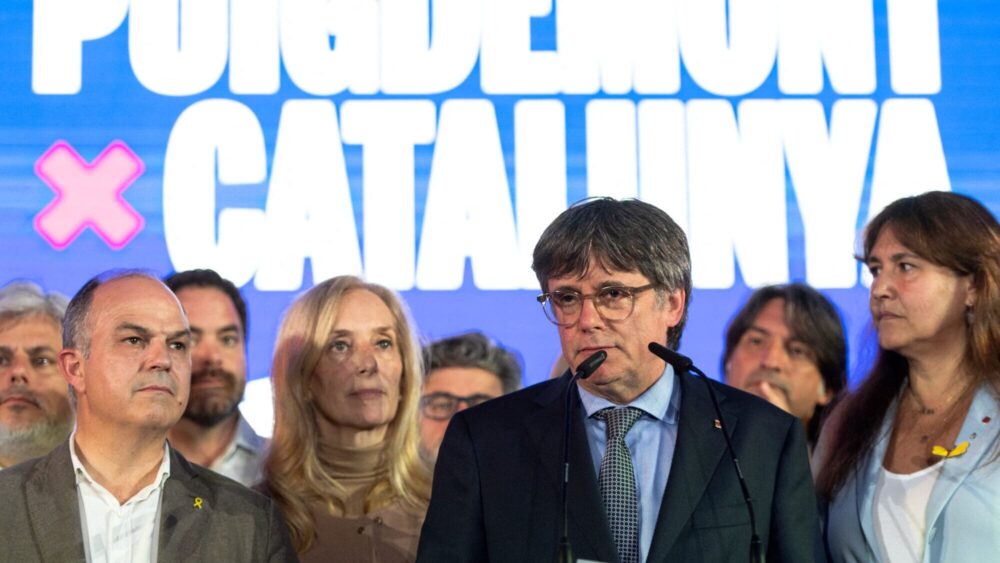
Catalan separatist leader Carles Puigdemont (second from right)
Matthieu RONDEL / AFP
Spain’s Supreme Court (TS) has denied amnesty to Carles Puigdemont, former MEP and fugitive from Spanish justice, complicating his planned return to his homeland and its politics.
The controversial amnesty law for Catalan separatists was passed just weeks ago—was written and passed with Puigdemont foremost in mind. Despite this, the Supreme Court has rejected his petition for amnesty for his crimes of embezzling public money. The same request on behalf of three other key Catalan separatist leaders was also rejected, dashing their hopes of re-entering Spanish politics.
In 2017, Puigdemont was the regional president of Catalonia. He used that role to organize an illegal referendum on the region’s independence from Spain and even declared the region independent. His declaration was unsuccessful; he fled the country shortly thereafter and has remained a fugitive of Spanish justice in Belgium ever since.
Other members of the regional government and participants in the referendum were caught, tried, and convicted. They served part of their prison sentences before receiving a form of pardon from prime minister Pedro Sánchez during his first term as premier. It was political horse trading made to secure the support of the Catalan separatists in the national parliament. The convicted politicians still remained banned from holding public office.
This term, Sánchez had to go even further to get the support of Catalan separatists, particularly Puigdemont’s Junts Per Catalonia party, which holds seven seats in the Congress of Deputies, granting amnesty to Puigdemont and other separatists. Hence the passage of the amnesty law.
However, the effort has backfired so far, as the TS has refused to amnesty the crime of embezzlement of public funds committed by Puigdemont and the former Catalan vice president Oriol Junqueras.
The decision is a complex one. Based on the text of the amnesty law itself, according to the ruling handed down. The law ruled out amnesty for misappropriation of public funds in two specific cases; first, when the embezzler personally enriched himself and second, if the case involved European Union funds or contradicted EU law. Separatists had been deeply involved in writing the text and must have thought the cases in question could clear such legal hurdles. The judges—the same tribunal that had tried many of the cases they were now asked to grant amnesty—found otherwise.
El Debate reports that the majority of judges found an amnesty for embezzlement of public funds did indeed fall afoul of EU law, calling the Spanish legislators “much more lenient” on such crimes than the EU. It notes that the EU has strengthened its stance against corruption in the public sector, expressly citing proposals on a new directive approved by both the European Parliament and the council, which prohibit amnesty for misuse of public funds.
The judges also found that Puigdemont and Junqueras did enrich themselves by using public funds to carry the referendum and campaign for Catalonia’s independence. The judges ruled that by using public funds, they avoided spending their own money on a matter that was in essence a personal political interest, even if shared by a wider public.
“Public funds put at the service of [the plaintiffs] purposes that were also particular, although they could be shared by a greater or lesser number of people. The financing of electoral campaigns, goals with political significance, propaganda or the implementation of one’s own political ideas, even if it has an idealistic aspect, also continues to bring a very personal benefit that acquires a personal nature when it has reported significant savings,” the ruling reads.
The ruling also chided the amnesty law as too hastily passed and too vague. It “is not able to express in legal propositions the genuine will of the legislator,” according to the TS.
The ruling leaves Puigdemont in a complicated position. He had run as his party’s presidential candidate in regional elections in May. His party made a fair, if not stellar, showing in the elections, and he is a possible candidate to head the regional government. He had promised to return to Spain and take up his seat in the regional parliament as it debates and votes on forming a government. But the ruling also kept in place the order for his arrest, meaning he risks being detained by police if he enters Spain.
